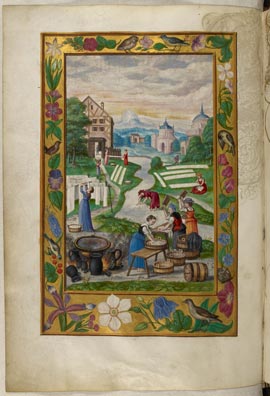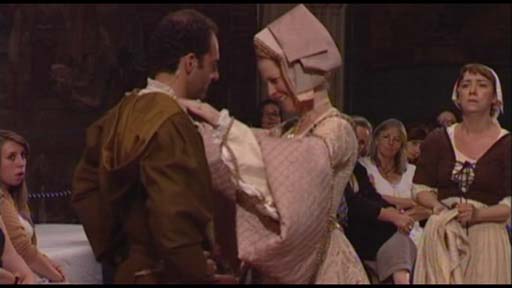Guystarde and Sygysmonde on Idleness
 Illustration of the Fifth Treatise: women engaged in laundry by a stream; borders decorated with birds and flowers. Image taken from Splendor Solis. Originally published/produced in Germany, 1582.
Illustration of the Fifth Treatise: women engaged in laundry by a stream; borders decorated with birds and flowers. Image taken from Splendor Solis. Originally published/produced in Germany, 1582.Here foloweth the amorous history of Guystarde and Sygysmonde was published in 1532. It is a translation of day 4 of Boccaccio's Decameron, and tells the tragic tale of the love between Guystarde and Sygysmonde. It is a conventional piece of Tudor chivalric poetry, particularly as regards its rehearsal of standard courtly love motifs. Robert Copland’s preface to the translator is noticeable because rather then emphasise the courtly aspect of Guystarde and Sygysmonde he instead presents the poem as a moral tale that warns against the dangers of idleness.
The inflammate desire / of your good intent
Newes to compile / eschewing idleness
Cometh of grace / and of wisdom excellent
To occupy such / as haue no business
Whiche unto of doing / much harm doth oppress
For surely idleness / is portresse of all synne
Every vice / ready to let in
The wretched life / of osyosyte
Engendreth sloth / poverty and payne
It is nourish / of voluptuosyte
And setteth the mynde on all things vaine
It sleeth the body / and troubleth the brain
Vnstedyeth the wit / and wasteth good deed
And letteth virtue / and goodness to proceed
Example plain / of idle Sygysmonde
Fed daintily / no maner work to use
Whiche caused idleness / for to habonde
And unto pleasure / set only for to muse
Dance / song / and play / she did not refuse
Whiche things assembled / engendered delight
Of natural lust / to do her appetite
Here lacketh business / and good pastime
Grace of good doing / was from her exiled
Caught as a bird / tangled with lime
First by one feather / and than with all beguiled
Right so who with this vice is fyled
Take with one synne / all other do then ensue
Er go / good business / is gate of virtue
Thus endeth the prologue.
References:
Guystarde and Sygysmonde. Here foloweth the amerous hystory of Guystarde and Sygysmonde / and of theyr dolorous deth by her father / newly translated out of laten into engysshe by Wyllymn Walter (London, 1532) sig. A2r.










